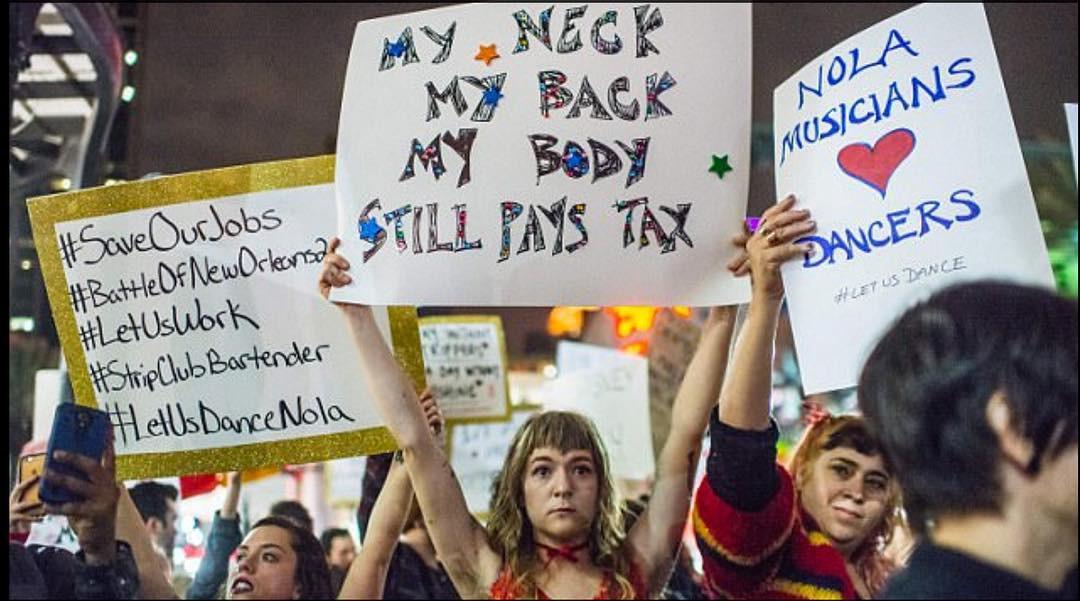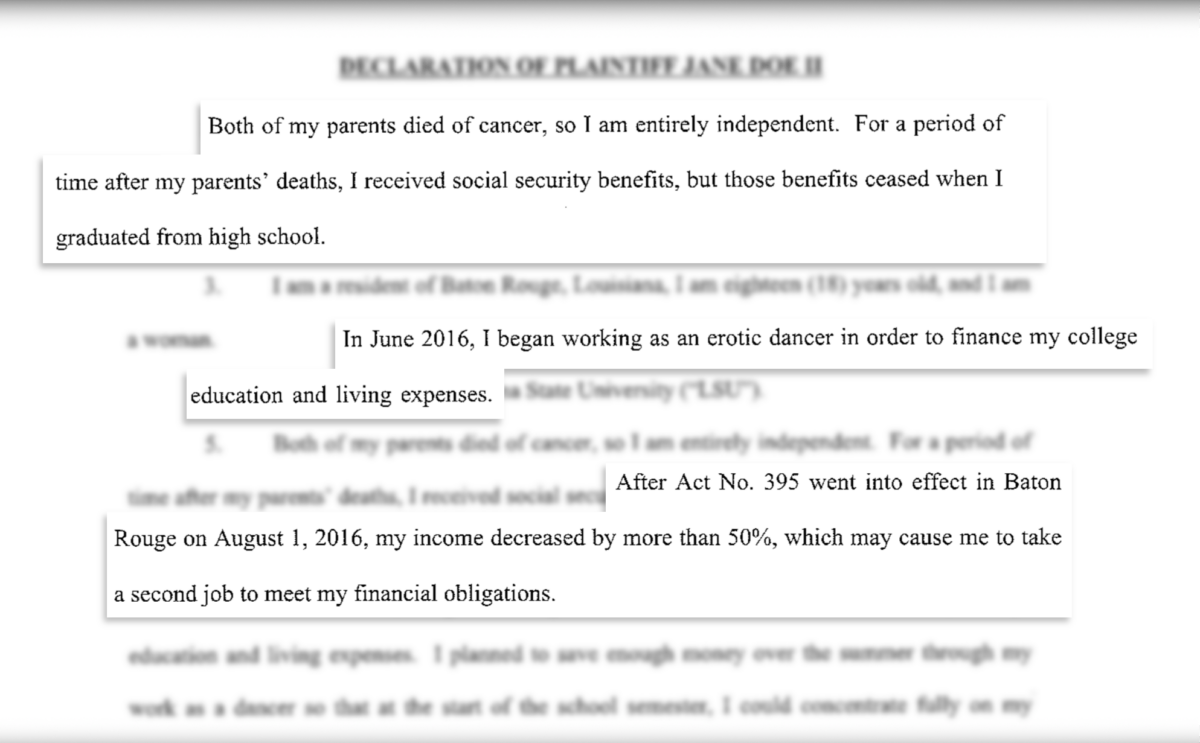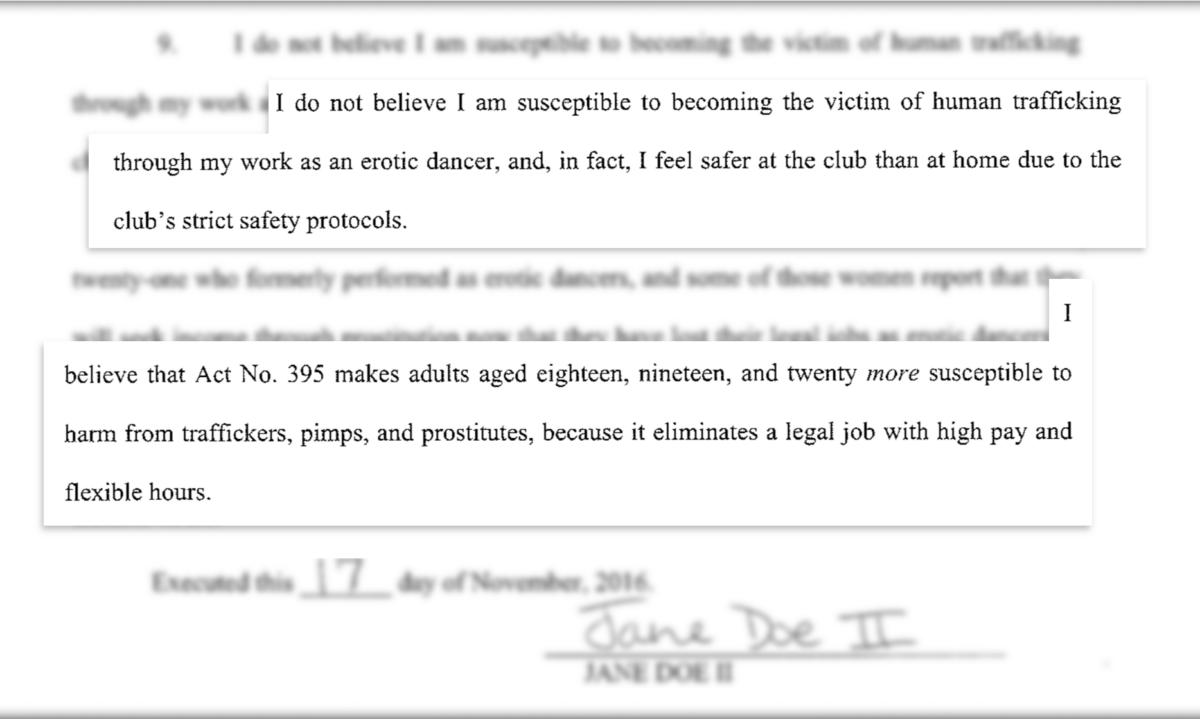New Orleans Strip Club Workers Battle ‘Age Ban’ In Federal Court
Last week, days after dancers took to the streets of New Orleans to protest recent police raids on the city’s strip clubs, the state agency that led them was in the Fifth Circuit Court of Appeals fending off a challenge to a Louisiana law barring 18-, 19-, and 20-year-olds from working as strip club dancers. In 2016, long before the raids, […]

Last week, days after dancers took to the streets of New Orleans to protest recent police raids on the city’s strip clubs, the state agency that led them was in the Fifth Circuit Court of Appeals fending off a challenge to a Louisiana law barring 18-, 19-, and 20-year-olds from working as strip club dancers. In 2016, long before the raids, three dancers who lost their jobs because of the age ban sued the Louisiana Office of Alcohol and Tobacco Control (ATC) arguing that new age limits violated their labor rights.
The age ban, known officially as “Act № 395,” passed the state legislature in 2016 with little opposition, pushed by social service agencies that alleged a link between strip clubs and sex trafficking — the same allegations that prompted January’s raids. In March 2017, a federal judge issued a temporary injunction, preventing the age ban from being enforced; the state is now appealing.
After oral arguments before the federal appeals court on February 7, the dancers’ case is now in the hands of a three-judge panel.
Dancers in New Orleans reject the claim that their workplaces contribute to trafficking. But dancers also made clear in their suit against the ban and later, in their January protests, that the ban will harm them and their families.
“Prior to my work as an erotic dancer,” plaintiff Jane Doe 1, age 20, declared in a court filing, “I helped care for my disabled mother.” She said in order to care for her mother, she worked multiple jobs, sometimes up to 120 hours each week. As a dancer, she said, she could set her own schedule, and earned enough to meet her obligations and save for retirement. If the age ban survives the legal challenge, Jane Doe 1 said, she would be forced to move out of state.

Jane Doe 2, age 18, from Baton Rouge, told the court that she has been on her own since both her parents died of cancer. Benefits she received after their deaths, she explained, ended when she graduated high school. Dancing is what allowed her to pay her college tuition.

Jane Doe 3, age 19, from New Orleans, has a 1-year-old daughter. After the ban went into effect, she said, “I was forced to stop working as an erotic dancer.” She said that the shot girl job — selling shots of liquor to club customers — she took in its place halved her income.
What the ban targets isn’t trafficking, the dancers argue, but rather their independence as working women. “I believe that Act №395 makes adults aged 18, 19, and 20 more susceptible to harm,” Jane Doe 2 said, because “it eliminates a legal job.”
The dancers sued ATC as Jane Does in order to protect themselves from being outed in the broader community — a move the defendant, ATC Commissioner Juanita Marine-Lombard, attempted to block. “These plaintiffs are not minors,” she declared in an opposing motion, “nor are they the victims of sexual assault or abuse, nor are they incompetent persons requiring extraordinary protection. Rather, they are women over the age of majority who have voluntarily engaged in the employment of erotic dancing in clubs, and who have voluntarily filed this lawsuit to challenge the constitutionality of a law.”
Yet the basis for the law is that adult women ages 18, 19, and 20 lack the maturity to make the decision to work as dancers. In their own motion, the dancers replied, “Defendant’s Opposition is all the more curious in light of — and tellingly inconsistent with — the State’s purported concern for ‘young women’ in the erotic dance industry.” Further, they stated, “Defendant has apparently seized upon an opportunity to further chill the exercise of Plaintiffs’ constitutional rights” — by making an attempt to halt the case unless the dancers provided their names.
A decision on the ban is not expected for some months, but during Wednesday’s arguments, two of the judges appeared to side with some of the dancers’ complaints. The state claimed, for instance, that the ban is clear about what conduct is prohibited. As proof, the state’s attorney, Scott Bergthold, ran through a rapid-fire list of what items women working in clubs are required to wear so as not to run afoul of the law. But Judge Edith Brown Clement pointed out that the ban was far from clear. “You’re not defining ‘cover’!” she pressed. “Covered totally? Cover a little bit? A little pastie cover? Or a bikini top cover?”
Bergthold, who represented the state in oral arguments on February 7, has deep roots in the Christian right, and has made a career of defending laws meant to shutter adult entertainment businesses. He is a graduate of the law school at Regent University, which described its alumnus as having “a God-inspired passion for the rule of law that has equipped him to be a Christian leader who is changing the world.”
Bergthold now works for Louisiana Attorney General Jeff Landry, defending the state’s age ban on dancers. Back in 2016, Landry assembled his own task force of state agents in New Orleans, claiming that under Mayor Mitch Landrieu, New Orleans had become “more dangerous than Chicago.” Landry’s agents continued to make arrests even after a judge said Landry lacked such authority in New Orleans. The task force was eventually disbanded in June 2017.
Bergthold was also hired last October by Landrieu to advise the city on a study of Bourbon Street strip clubs. The Chattanooga-based lawyer represents city governments from California to South Dakota to Florida, seeking to eliminate strip clubs and other adult businesses. A Knoxville City Council member once described Bergthold as “just a franchisee [who] goes around from city to city and sells these laws, and municipalities pass them, and then we hire him to represent the city at $200 per hour.” Bergthold currently holds a $15,000 contract with the city of New Orleans.
On the same day Bergthold defended the age ban in federal court, the New Orleans City Planning Commission proposed a “soft cap” on strip clubs. Bergthold was contracted to advise the city on adult zoning ordinances, as well as the city’s alcohol code. Such code enforcement is how the Louisiana Office of Alcohol and Tobacco Control targeted Bourbon Street clubs in January’s raids, assessing a total of $28,600 in fines— a sum dancers from Bourbon Alliance of Responsible Entertainers (BARE) calculated that a single dancer working the Mardi Gras season could easily earn. Meanwhile, the raids and ensuing club closures took money out of dancers’ own pockets. “That’s food from our families’ mouths, our debts and bills, our dreams, that’s healthcare costs, that’s our freedom pulled out from under us,” BARE posted on Instagram, captioning a protest sign on Bourbon Street addressed to the outgoing mayor: “Mitch — if all you needed was $28K we would have helped!”
